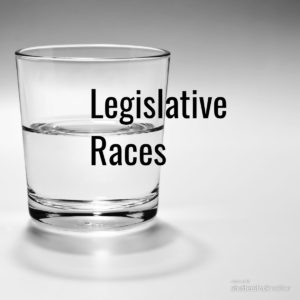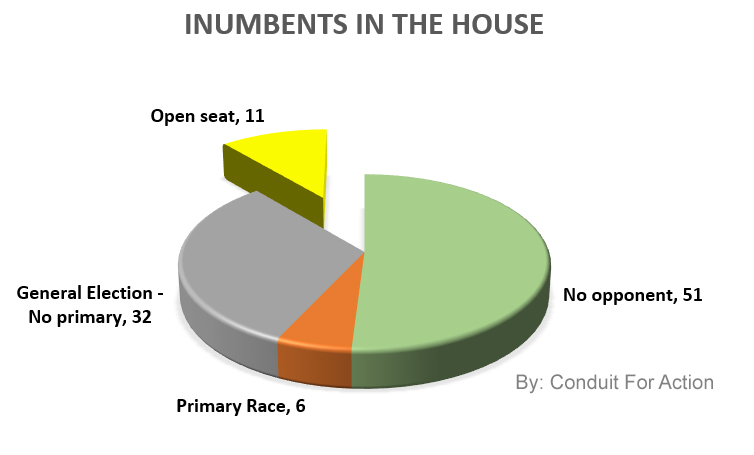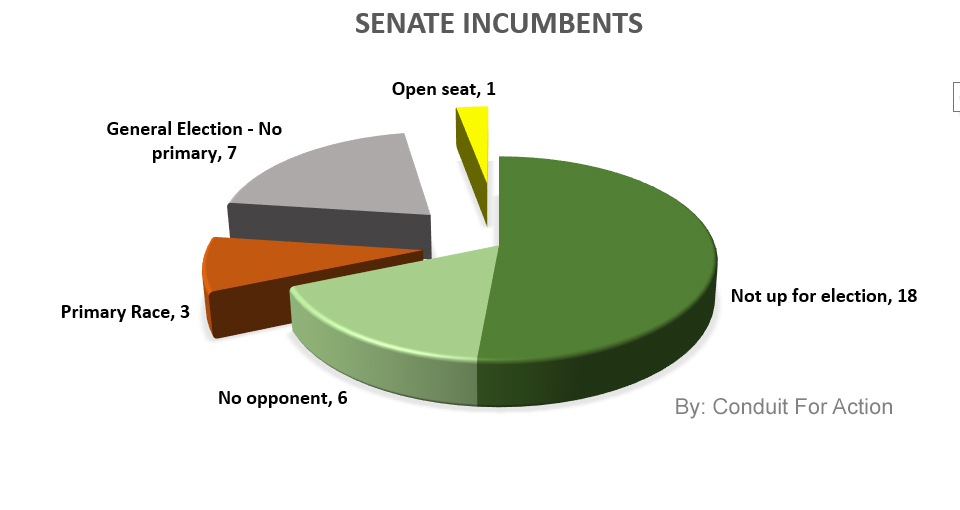Legislative Races: Half Empty or Half Full?
The filing period to run for the Arkansas legislature has ended.
Gone are the days when one-third or more of the seats in the legislature would be open seats with no incumbent. This is because term limits changed from three two-year terms in the House of Representatives and two four-year terms in the Senate to a longer term limit of sixteen years in the legislature.
In the House of Representatives only ten (10) of the one hundred (100) seats are open seats with no incumbent running. In the Senate where only half of the thirty-five Senators are up for election there is only one (1) seat without an incumbent running. In many races the incumbent drew no opposition.
 The Good News: In the Arkansas Senate there will be a Republican majority even if they lose every contested race. To have a majority in the House of Representatives the Republicans only need to win thirteen of the forty-nine contested races. Realistically, it appears the Republicans will continue to have large majorities in both chambers.
The Good News: In the Arkansas Senate there will be a Republican majority even if they lose every contested race. To have a majority in the House of Representatives the Republicans only need to win thirteen of the forty-nine contested races. Realistically, it appears the Republicans will continue to have large majorities in both chambers.
The Bad News: The Republican controlled legislature has increased the tax burden, grown government, grown crony capitalism, and resisted draining the swamp.
So is the glass half empty or half full? It is half full.
First, as disappointed as we are in the many Arkansas Republicans who abandoned conservative principles, the prospect of Democrats making gains in the legislature is bad – scary bad.
Second, a few of the Republicans who will be returning have already been voting to stop new taxes and to reduce spending, there is hope newly elected Republicans will be loyal to conservative principles, and there is hope some of the Republicans who have been voting BLUE, will return to the principles of the party, principles such as lower taxes and limited government. This can happen if YOU continually remind them of what they claimed to be. It was not long ago that the Craighead County Republican Committee showed their frustration with a non-binding resolution asking legislators to return to the conservative principles of the party. Senator John Cooper disliked that idea so much he called his own county committee a bunch of Soviets. Cooper is now being challenged for election by Representative Dan Sullivan. This will be an interesting primary race to watch for what it says about the direction of the Republican Party. Cooper has the power of incumbency but Sullivan has a solid conservative record.
Third, legislators know the record they make in the 2021 legislative session will be extremely important. Why? Because their districts will be redrawn for the 2022 election and every legislator will be up for reelection. When districts are redrawn under reapportionment, incumbents are the most vulnerable.
Legislators know the record they make in the 2021 legislative session will be extremely important. Why? Because their districts will be redrawn for the 2022 election and every legislator will be up for reelection. When districts are redrawn under reapportionment, incumbents are the most vulnerable.
Digging Deeper: Legislative Races
Looking for more detail on the legislative races see below.
Arkansas House of Representatives

Of the fifty-one incumbents who have no opponent, 38 are Republicans and 13 are Democrats.
Of the six incumbents who will face an opponent in their party primary, five are Republicans and one is a Democrat. The five Republicans are: Representatives Jon S. Eubanks, Jana Della Rosa, Marcus Richmond, Brandt Smith, and Nelda Speaks. The Democrat is Representative Denise Ennett. Four of these Republicans will also face an opponent in the general election if they win their primary.
Of the thirty-two incumbents who have no primary opponent but who will face an opponent in the general election, twenty-three are Republicans and nine are Democrats.
Of the eleven open seats, ten were held by Republicans and one was held by a Democrat.
Arkansas Senate

The Republican Party is guaranteed to have a majority of the Senate seats in 2021. The only question is how large will the majority be.
With eighteen Senate seats not up for election and six more incumbent Senators having no opponent, twenty-four of the current Senators (of thirty-five) are guaranteed to be back in 2021.
The six incumbents with no opponent are all Republicans. Of the eighteen Senators not up for reelection thirteen are Republicans and five are Democrats.
Of the three incumbent Senators with a primary opponent, two are Republicans and one is a Democrat. The two Republicans are Senator Alan Clark and Senator John Cooper. If Clark wins his primary, he will also face an opponent in the general election. The Democrat with a primary race is Senator Stephanie Flowers.
Of the seven incumbent Senators with no primary opponent but an opponent in the general election, five are Republicans and two are Democrats.
The one Senate seat with no incumbent is currently held by Democrat Senator Will Bond.
